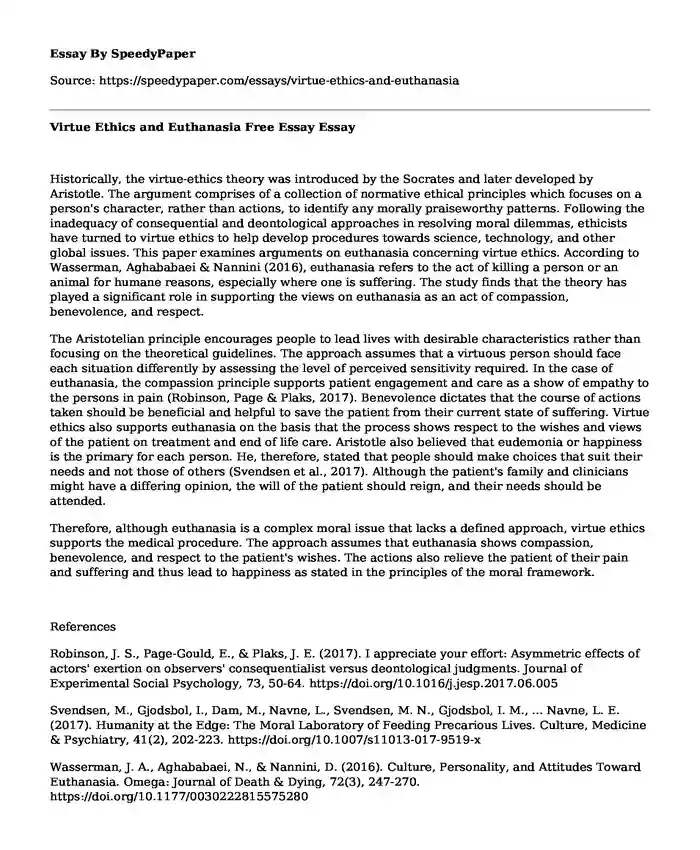
| Type of paper: | Critical thinking |
| Categories: | Euthanasia |
| Pages: | 2 |
| Wordcount: | 460 words |
Historically, the virtue-ethics theory was introduced by the Socrates and later developed by Aristotle. The argument comprises of a collection of normative ethical principles which focuses on a person's character, rather than actions, to identify any morally praiseworthy patterns. Following the inadequacy of consequential and deontological approaches in resolving moral dilemmas, ethicists have turned to virtue ethics to help develop procedures towards science, technology, and other global issues. This paper examines arguments on euthanasia concerning virtue ethics. According to Wasserman, Aghababaei & Nannini (2016), euthanasia refers to the act of killing a person or an animal for humane reasons, especially where one is suffering. The study finds that the theory has played a significant role in supporting the views on euthanasia as an act of compassion, benevolence, and respect.
The Aristotelian principle encourages people to lead lives with desirable characteristics rather than focusing on the theoretical guidelines. The approach assumes that a virtuous person should face each situation differently by assessing the level of perceived sensitivity required. In the case of euthanasia, the compassion principle supports patient engagement and care as a show of empathy to the persons in pain (Robinson, Page & Plaks, 2017). Benevolence dictates that the course of actions taken should be beneficial and helpful to save the patient from their current state of suffering. Virtue ethics also supports euthanasia on the basis that the process shows respect to the wishes and views of the patient on treatment and end of life care. Aristotle also believed that eudemonia or happiness is the primary for each person. He, therefore, stated that people should make choices that suit their needs and not those of others (Svendsen et al., 2017). Although the patient's family and clinicians might have a differing opinion, the will of the patient should reign, and their needs should be attended.
Therefore, although euthanasia is a complex moral issue that lacks a defined approach, virtue ethics supports the medical procedure. The approach assumes that euthanasia shows compassion, benevolence, and respect to the patient's wishes. The actions also relieve the patient of their pain and suffering and thus lead to happiness as stated in the principles of the moral framework.
References
Robinson, J. S., Page-Gould, E., & Plaks, J. E. (2017). I appreciate your effort: Asymmetric effects of actors' exertion on observers' consequentialist versus deontological judgments. Journal of Experimental Social Psychology, 73, 50-64. https://doi.org/10.1016/j.jesp.2017.06.005
Svendsen, M., Gjodsbol, I., Dam, M., Navne, L., Svendsen, M. N., Gjodsbol, I. M., ... Navne, L. E. (2017). Humanity at the Edge: The Moral Laboratory of Feeding Precarious Lives. Culture, Medicine & Psychiatry, 41(2), 202-223. https://doi.org/10.1007/s11013-017-9519-x
Wasserman, J. A., Aghababaei, N., & Nannini, D. (2016). Culture, Personality, and Attitudes Toward Euthanasia. Omega: Journal of Death & Dying, 72(3), 247-270. https://doi.org/10.1177/0030222815575280
Cite this page
Virtue Ethics and Euthanasia Free Essay. (2022, Dec 01). Retrieved from https://speedypaper.com/essays/virtue-ethics-and-euthanasia
Request Removal
If you are the original author of this essay and no longer wish to have it published on the SpeedyPaper website, please click below to request its removal:
- Free Essay Sample on Pope Urban's Speech at Clermont
- Management Essay Example: Strategic Management Case Analysis
- Free Essay Example on Diversity and Differences
- Reflection Essay Sample on the Listening: The Forgotten Skill Book
- Free Essay Assessing Students' Knowledge about the Flu
- Free Essay Example: Banking in the Early Development of United States
- Essay Sample on Personal Relationship and Wellness
Popular categories




